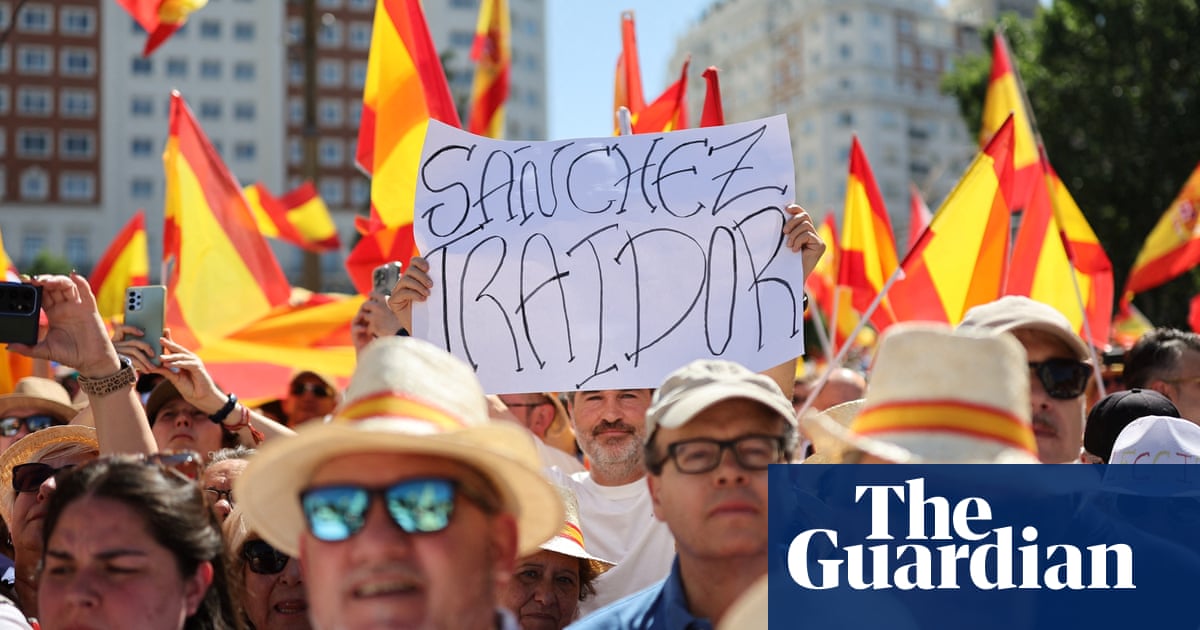Tens of thousands of people have gathered in central Madrid to protest against the government of Spain’s socialist prime minister,Pedro Sánchez, and to demand an early general election as his party, his administration and his family continue to be beset by a succession of corruption allegations.
Sunday’s protest, called by the opposition conservative People’s party (PP) under the slogan “Mafia or democracy”, attracted between 45,000 and 50,000 people, according to the central government’s delegation to the region. Organisers, however, put the attendance at 100,000.
Both Sánchez’s government and his inner circle have faced a series of corruption allegations over the past year. But pressure on his Spanish Socialist Workers’ party (PSOE) has increased over recent days after a former member of the party was accused of trying to wage a smear campaign against the Guardia Civil police unit investigating the prime minister’s wife, Begoña Gómez, his brother, David Sánchez, and the former transport minister, José Luis Ábalos.
Leire Díaz – who resigned from the PSOE after recordings were leaked in which she appeared to offer judicial leniency in return for compromising information on senior members of the unit – has denied working on behalf of the prime minister or the party, saying she was researching a book on corruption.
As demonstrators congregated in the midday heat of the Plaza de España, carrying placards bearing messages such as “Sánchez traitor” and “Government resign”, the PP’s leader, Alberto Núñez Feijóo, renewed his call for a snap election.
“Spain needs a revolution of decency and freedom – and we will lead that revolution from the streets and at the ballot boxes,” he told the crowd.
“Mr Sánchez, stop hiding, stop lying and stop running. Spain knows only too well who you are and what you have done. Yield to democracy. Call an election: we want one now because no one voted for this, not even your supporters.”
The prime minister has accused his political and media opponents of conducting a“harassment and bullying operation”against him and his wife, arguing that the false allegations levelled at her are designed to bring about his “personal and political collapse”.
Sign up toHeadlines Europe
A digest of the morning's main headlines from the Europe edition emailed direct to you every week day
after newsletter promotion
Gómez is being investigated for alleged corruption and influence peddling after a complaint by the pressure group Manos Limpias (Clean Hands), a self-styled trade union with far-right links that has a long history of using the courts to pursue political targets. Manos Limpias hasaccused Gómez of using her influenceas the wife of the prime minister to secure sponsors for a university master’s degree course that she ran. Sánchez has described the case against his wife as baseless and “an ugly fit-up driven by the far-right groups behind the complaint”.
Meanwhile, David Sánchez is facing trial over allegations of influence peddling and other offences in a case that also began with accusations from Manos Limpias and other groups. He denies the charges.
Sánchez’s administration has also been facing questions since it emerged in February last year that an assistant to Ábalos, once a close ally and confidant of the prime minister, had been arrested on suspicion of taking payments to facilitate contracts for face masks during the coronavirus pandemic.
But the PP, which wasousted from governmentseven years ago following a series of corruption scandals, is itself under scrutiny on several fronts, not least overits handling of the deadly floodslast year in Valencia, one of the regions it governs.
Isabel Díaz Ayuso, the populist PP president of the Madrid region – and one of the prime minister’s most vocal critics – is also facing continuing questions over her government’s Covid protocols after more than 7,200 people died in the region’s care homes during the early stages of the pandemic. She has also been forced to defend herrelationship with her partner, Alberto González Amador, after judges began investigating his business dealings.
González Amador is under investigation for a variety of alleged offences and has been charged with two counts of tax fraud and one of document forgery in connection to fees he charged a company that imported face masks during the pandemic. Ayuso has said her partner has been targeted by “all the powers of the state” purely because of his relationship with her, while a member of her administration recently said the “presumption of innocence should be respected”.
